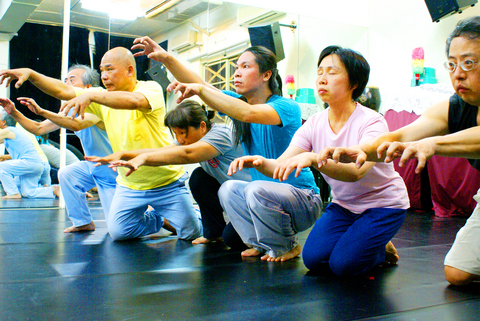Claire Cunningham, a physically disabled dancer from the UK, expertly flips, twirls and delicately moves around using a harness, which illustrates that disabilities are no barrier to sublime movement.
The contemporary dance and aerial performance by UK-based Blue Eyed Soul Dance Company — of which Cunningham is a member — called Don't Touch Me kicked off the Sixth Sense in Performing Arts Festival currently running at the Guling Street Theater until Sunday.

PHOTO: NOAH BUCHAN, TAIPEI TIMES
"We don't want critics to approach our work any differently than they would other kinds of dance or theater," said Rachael Freeman, Blue Eyed Soul Dance Company's founder and artistic director. "We want them to be objective."
Freeman's comments illustrate a common problem disabled actors and dancers encounter when taking to the stage; traditional theater and dance communities and critics still find it difficult to judge disabled performers on the merits of the pieces presented.
Choreographer Lee Hsiao-lei (李曉蕾) attempts to move beyond disability with Edge Roaming, a theatrical and dance piece that starts tomorrow.
With music, dialogue and dance, the show brings together two professional and seven legally blind amateur dancers, and is more like contemporary drama than dance. Lee worked with the performers before at workshops and the collaborative effort was commissioned by Guling Street Theater.
Edge Roaming is divided into three sections, each of which represents a journey. When seen as a whole the piece conveys a message of realizing and overcoming fear, a process through which individuals grow stronger.
As the title suggests, the travelers are moving on the margins of society, but through the action on the stage, the characters are able to appreciate their own unique role in society and thereby transcend the boundaries they face.
"This is inclusive theater," Lee said after rehearsals for the show earlier in the week. "I don't want people to think that because they are disabled they should be felt sorry for."

In the March 9 edition of the Taipei Times a piece by Ninon Godefroy ran with the headine “The quiet, gentle rhythm of Taiwan.” It started with the line “Taiwan is a small, humble place. There is no Eiffel Tower, no pyramids — no singular attraction that draws the world’s attention.” I laughed out loud at that. This was out of no disrespect for the author or the piece, which made some interesting analogies and good points about how both Din Tai Fung’s and Taiwan Semiconductor Manufacturing Co’s (TSMC, 台積電) meticulous attention to detail and quality are not quite up to

April 21 to April 27 Hsieh Er’s (謝娥) political fortunes were rising fast after she got out of jail and joined the Chinese Nationalist Party (KMT) in December 1945. Not only did she hold key positions in various committees, she was elected the only woman on the Taipei City Council and headed to Nanjing in 1946 as the sole Taiwanese female representative to the National Constituent Assembly. With the support of first lady Soong May-ling (宋美齡), she started the Taipei Women’s Association and Taiwan Provincial Women’s Association, where she

It is one of the more remarkable facts of Taiwan history that it was never occupied or claimed by any of the numerous kingdoms of southern China — Han or otherwise — that lay just across the water from it. None of their brilliant ministers ever discovered that Taiwan was a “core interest” of the state whose annexation was “inevitable.” As Paul Kua notes in an excellent monograph laying out how the Portuguese gave Taiwan the name “Formosa,” the first Europeans to express an interest in occupying Taiwan were the Spanish. Tonio Andrade in his seminal work, How Taiwan Became Chinese,

Mongolian influencer Anudari Daarya looks effortlessly glamorous and carefree in her social media posts — but the classically trained pianist’s road to acceptance as a transgender artist has been anything but easy. She is one of a growing number of Mongolian LGBTQ youth challenging stereotypes and fighting for acceptance through media representation in the socially conservative country. LGBTQ Mongolians often hide their identities from their employers and colleagues for fear of discrimination, with a survey by the non-profit LGBT Centre Mongolia showing that only 20 percent of people felt comfortable coming out at work. Daarya, 25, said she has faced discrimination since she